|
|
|
Sort Order |
|
|
|
Items / Page
|
|
|
|
|
|
|
| Srl | Item |
| 1 |
ID:
117602
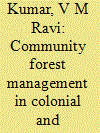

|
|
|
|
|
| Publication |
2012.
|
| Summary/Abstract |
In the past two decades, South Asia has undergone robust reforms in the forestry sector which claim to be initiating a transformation from state-centric to people-centric forest management. This shift is perceived as an important move towards decolonisation in governance processes in India. Examining the forest policies in colonial and postcolonial South India, this article finds, however, that community forest management in postcolonial India remains substantially rooted in the colonial framework of forest resource management policies. In practice, this means that exploitation of forests gives some consideration to the requirements of forest-dependent communities today, but does so now under the control of a state that fails to protect the most basic rights of many of its most vulnerable citizens. The article thus argues critically that supposedly people-centric community forest management in India is not sensitive enough to local development needs, nor indeed sufficiently protective of the basic needs of many forest-dependent people.
|
|
|
|
|
|
|
|
|
|
|
|
|
|
|
|
| 2 |
ID:
145397
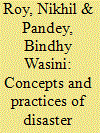

|
|
|
|
|
| Summary/Abstract |
From the above discussions it is clear that even though hazards are unavoidable, disasters are preventable. This has created the discipline and the practise of Disaster Management, wherein, the risk of disaster and the vulnerability of people to disaster is reduced. An example of how disaster management reduce the loss to life and property is the case of the coastal areas of Andhra Pradesh and Orissa in India.
|
|
|
|
|
|
|
|
|
|
|
|
|
|
|
|
| 3 |
ID:
098092


|
|
|
| 4 |
ID:
148512
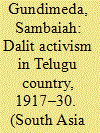

|
|
|
|
|
| Summary/Abstract |
This article argues that the politics of lower castes and their struggles for social equality and political representation cannot be effectively subsumed under a homogenous non-Brahmin category. Contesting the argument that the mobilisation of the lower castes/non-Brahmins in southern India was organised around the ideology of Dravidianism, this research examines what is today called Dalit activism in the Telugu country, related to the ideology of Adi-Dravida/Adi-Hindu. It also identifies discrimination of Dalits as well as between Dalits, in times before Gandhi and Ambedkar appeared on the scene.
|
|
|
|
|
|
|
|
|
|
|
|
|
|
|
|
| 5 |
ID:
100966
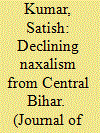

|
|
|
|
|
| Publication |
2010.
|
| Summary/Abstract |
The Naxal problem has become the biggest internal threat to the country. Especially after the comments of the Prime Minister Manmohan Singh in 2007, it has become a matter of concern as well as a subject of academic debate. The new thought, innovative ideas and fresh planning have been developed to address this issue extensively and intensively. In this backdrop, a case study of Central Bihar becomes relevant to focus the light on this issue. It is an established fact that Naxalism in Bihar had made its route through Central Bihar. When the Counterinsurgency mechanism crushed the first bubbles of Naxalism in West Bengal and Andhra Pradesh, it found its breeding ground in Central Bihar. Repeated massacres and Naxal terror in Central Bihar became the concern for the country in 1980s and 1990s. It argues that the changing socio-economic conditions along with other factors massively restricted the Maoist popularity and strength in the Central Bihar.
|
|
|
|
|
|
|
|
|
|
|
|
|
|
|
|
| 6 |
ID:
107954
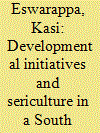

|
|
|
|
|
| Publication |
2011.
|
| Summary/Abstract |
This article demonstrates that certain developmental initiatives have been playing an important role in the socio-economic progress of rural masses in South India and typically involve a number of focused projects. Development of sericulture is shown as a key strategy for supporting backward regions. With particular reference to Kotha Indlu village of Chittoor district in Andhra Pradesh, this article explains the increased returns from sericulture as a result of development programmes. The article concludes with some suggestions to improve the long-term feasibility of sericulture.
|
|
|
|
|
|
|
|
|
|
|
|
|
|
|
|
| 7 |
ID:
153133
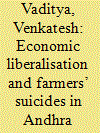

|
|
|
|
|
| Summary/Abstract |
Adversely affected by globalisation and state-based policy changes, India’s agricultural sector has recently experienced a marked increase in farmer suicides, most prominently in Andhra Pradesh (AP). This article examines the various policy changes leading to such agrarian distress and seeks to explore how the troubling phenomenon of farmers’ suicides may be curbed.
|
|
|
|
|
|
|
|
|
|
|
|
|
|
|
|
| 8 |
ID:
170268
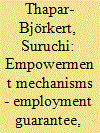

|
|
|
|
|
| Summary/Abstract |
The Mahatma Gandhi National Rural Employment Guarantee Act (NREGA) in India opens a new chapter in rural governance, signifying transformative potential for enhancing economic and social security. One of the key objectives of the Act is to aid in the empowerment of marginalised communities, especially women, Scheduled Castes (SCs) and Scheduled Tribes (STs). However, no analytically rigorous attempt has been made to study the mechanisms and processes that are leading to empowerment or even the (unintended) processes of disempowerment. Our paper investigates (dis) empowerment as a process rather than as a (quantifiable) outcome and analyses the mechanisms through which the embedded gender and caste norms are being challenged (though not completely eroded), but also how powerful actors at household, community and market levels can come to resent processes that entail upward mobility of women and marginalised communities. We draw on a comparative study based on extensive qualitative indepth interviews and participant observation, in rural areas of two Indian states, Uttar Pradesh (North India) and Andhra Pradesh (South India). The former exhibits almost all the elements we associate with low development, whereas the latter belongs to a group of southern Indian states with higher levels of human and economic development.
|
|
|
|
|
|
|
|
|
|
|
|
|
|
|
|
| 9 |
ID:
121837
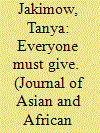

|
|
|
|
|
| Publication |
2013.
|
| Summary/Abstract |
Bridegroom price is extracting a heavy toll on the poor in rural Telangana, Andhra Pradesh, India. Poor households are becoming indebted and losing assets to pay the increasing amounts demanded by grooms at the time of their daughters' weddings. Bridegroom price is a relatively recent phenomenon in the area, first practiced amongst scheduled and backward caste groups less than two decades ago. This article draws upon practice theory and cultural neo-institutionalism to offer an alternative explanation for the emergence and persistence of bridegroom price as a time, space and socially specific institution. Using empirical material from in-depth qualitative interviews in two villages in Telangana, Andhra Pradesh in 2010, it suggests that bridegroom price emerged as a result of shifts in the subjectivities of low-caste men, and in particular the evaluation of the self in relation to the social whole. The article seeks to contribute to existing explanations for bridegroom price and dowry, while also arguing that theoretically informed approaches are necessary in order to develop effective measures to combat these institutions.
|
|
|
|
|
|
|
|
|
|
|
|
|
|
|
|
| 10 |
ID:
179986
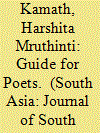

|
|
|
|
|
| Summary/Abstract |
Kavijanāśrayamu, or A Guide for Poets, is the oldest extant text on prosody written in Telugu. For centuries, poets and scholars have debated the authorship, date and geographical location of this text. According to some scholars, the text was authored by Malliya Recana, a Jain scholar of prosody from the tenth century who predates Nannaya, long considered to be the ‘first poet’ (ādikavi) of classical Telugu. In this article, I argue that the contentious epithet of ‘first poet’ ascribed to Recana is intimately tied to the premodern past and the contemporary landscape of the Telugu-speaking states of Telangana and Andhra Pradesh.
|
|
|
|
|
|
|
|
|
|
|
|
|
|
|
|
| 11 |
ID:
115257
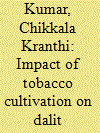

|
|
|
|
|
| Publication |
2012.
|
| Summary/Abstract |
This paper highlights the consequences of the economic and educational change among the Dalits of Karavadi. The tobacco cultivation that engages a large amount of labour has attracted the left political parties for the spread of their ideology and recruitment of party workers. It has helped in working against the practice of untouchability. Further, it has enabled the Dalits to be politically conscious and seriously participate in the political process. The growth of educational institutions in the village and the economic improvement have together helped the Dalits to assert their political and economic rights in the village. As a cumulative effect, the hegemonic inter-caste relations in the village have changed, though caste bias has not disappeared.
|
|
|
|
|
|
|
|
|
|
|
|
|
|
|
|
| 12 |
ID:
126096
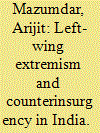

|
|
|
|
|
| Publication |
2013.
|
| Summary/Abstract |
India has a long history of left-wing extremism. The largest and most powerful left-wing extremist group today is the Communist Party of India (CPI) (Maoist), which is active in many states across the country. Its ultimate goal is to capture power through a combination of armed insurgency and mass mobilisation. In recent times, the southern state of Andhra Pradesh has achieved notable success in counterinsurgency operations against the Maoists. This article outlines the 'Andhra model', which involves a mix of security, development and political approaches. It also examines whether this model can be replicated in other Indian states affected by left-wing extremism.
|
|
|
|
|
|
|
|
|
|
|
|
|
|
|
|
| 13 |
ID:
148515
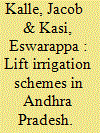

|
|
|
|
|
| Summary/Abstract |
Despite efforts by the Indian state to develop and maintain various irrigation strategies, many projects have not achieved the desired results, often due to systemic problems inherent in these initiatives. Meanwhile, the growing scarcity of water in South Asia propels new thinking about remedies. Based on detailed fieldwork, this article, which seems at first completely unrelated to matters of caste discrimination, assesses the sustainability of lift irrigation schemes (LIS) in Andhra Pradesh (AP). Asking critical questions about the management of such schemes, it also addresses the impact of new technologies on rural development, arguing that continuing technology-savvy engagement of the state in the irrigation sector is needed. While it is found that apart from issues of better management, increased use of solar energy could be a real boon for strengthening economic viability and environmental sustainability, the research identifies additional reasons, of a socio-political nature, which may explain why state support for marginal farmers in the area under examination is being withheld.
|
|
|
|
|
|
|
|
|
|
|
|
|
|
|
|
| 14 |
ID:
121783
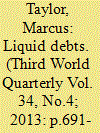

|
|
|
|
|
| Publication |
2013.
|
| Summary/Abstract |
This paper uses an approach grounded in political ecology and political economy to explain the social and ecological foundations of groundwater overexploitation and agrarian distress within semi-arid Andhra Pradesh It emphasises how relations of credit/debt have become intertwined with the tenuous social and ecological foundations of smallholder production to create a new dynamic of vulnerability across the agrarian environment. It thereby links cycles of groundwater depletion to the debt-driven survival strategies of India's small and marginal farmers within a context of dramatic changes in Indian agrarian social relations over the past three decades. In so doing, it critiques established perspectives that portray the trend towards acute groundwater overexploitation as stemming from inadequate regulation or information deficits among rural producers. Ultimately it argues that groundwater overexploitation represents a common tragedy of debt-driven livelihoods within an austere agrarian environment.
|
|
|
|
|
|
|
|
|
|
|
|
|
|
|
|
| 15 |
ID:
154557
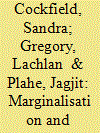

|
|
|
|
|
| Summary/Abstract |
India is in the grip of an agrarian crisis. Economic, social, environmental and political forces have adversely affected the relationship between the small-scale primary producer and the production process. In the context of this crisis, traditional knowledge-inspired food systems have given rise to ‘islands of success’ that have allowed small and marginal farmers to reclaim their livelihoods across the country. In this paper, we analyse three different islands of success using an agro-ecological framework, arguing that such islands of success based on traditional knowledge are becoming an increasingly necessary approach to agriculture. However, political will, political engagement and effective policies that support traditional knowledge in agriculture are required for these islands of success to become waves of change.
|
|
|
|
|
|
|
|
|
|
|
|
|
|
|
|
| 16 |
ID:
097137
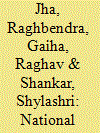

|
|
|
|
|
| Publication |
2010.
|
| Summary/Abstract |
This paper presents results on the participation of rural workers in the National Rural Employment Guarantee Programme based on a pilot survey of three villages in the Chittoor district, Andhra Pradesh (AP), India. These villages are Kaligiri, Obulayyapale and Reddivaripalle, and they were surveyed in December 2007. In contrast to an earlier study of ours on Rajasthan, Scheduled Castes (SCs) and Scheduled Tribes (STs) participated in higher numbers in AP, but in both states these groups participated for slightly lower spells than the residual group of 'Others'. We find that AP performed better than Rajasthan in terms of targeting poorer caste and income groups such as SCs, STs and landless households. The number of days worked on average was much higher than suggested by other assessments. Our econometric analysis further reinforces the view that disadvantaged groups are not only more likely to participate but also for longer spells. Thus the performance of the National Rural Employment Guarantee Programme has been far from dismal.
|
|
|
|
|
|
|
|
|
|
|
|
|
|
|
|
| 17 |
ID:
107425
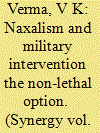

|
|
|
| 18 |
ID:
119287
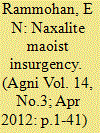

|
|
|
| 19 |
ID:
113203
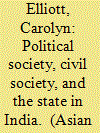

|
|
|
|
|
| Publication |
2012.
|
| Summary/Abstract |
This article is an ethnography portraying the processual and performative dimensions of the 2009 state assembly election in Andhra Pradesh. It shows how upper castes have persisted in power in a multicaste and increasingly democratic society through the distribution of welfare and patronage benefits to more marginalized segments of society. Conceptually, it argues for the importance of "political society" over "civil society," when examining state-society relations in neoliberal, democratic India.
|
|
|
|
|
|
|
|
|
|
|
|
|
|
|
|
| 20 |
ID:
102751
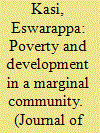

|
|
|
|
|
| Publication |
2011.
|
| Summary/Abstract |
The concepts of poverty and development have many meanings in contemporary globalized societies. Development by definition implies desired changes in terms of livelihood, improved quality of life and better access to assets and services, etc. However in reality development programmes sometimes have negative consequences, perhaps unintended, multiplying the acute scarcity of resources and opportunities, or reproducing poverty. Also, the consequences of developmental programmes often appear to be out of focus, and seen at the ground level, there seems to be a gap between what is intended and what is actualized. In this framework, this paper presents a case study of the social, cultural and economic correlates of the development processes in Adadakulapalle, a settlement of Sugali peoples, once a semi-nomadic tribe, in Anantapur District of Andhra Pradesh, South India. The paper shows how factionalism and faction politics affect the implementation of development interventions. It also looks at the poverty in the settlement and focuses on the types of change that people have experienced with the implementation of different schemes by both government and other agencies. The type of change is discussed in the present study through the macro and micro analysis of development programmes.
|
|
|
|
|
|
|
|
|
|
|
|
|
|
|
|
|
|
|
|
|